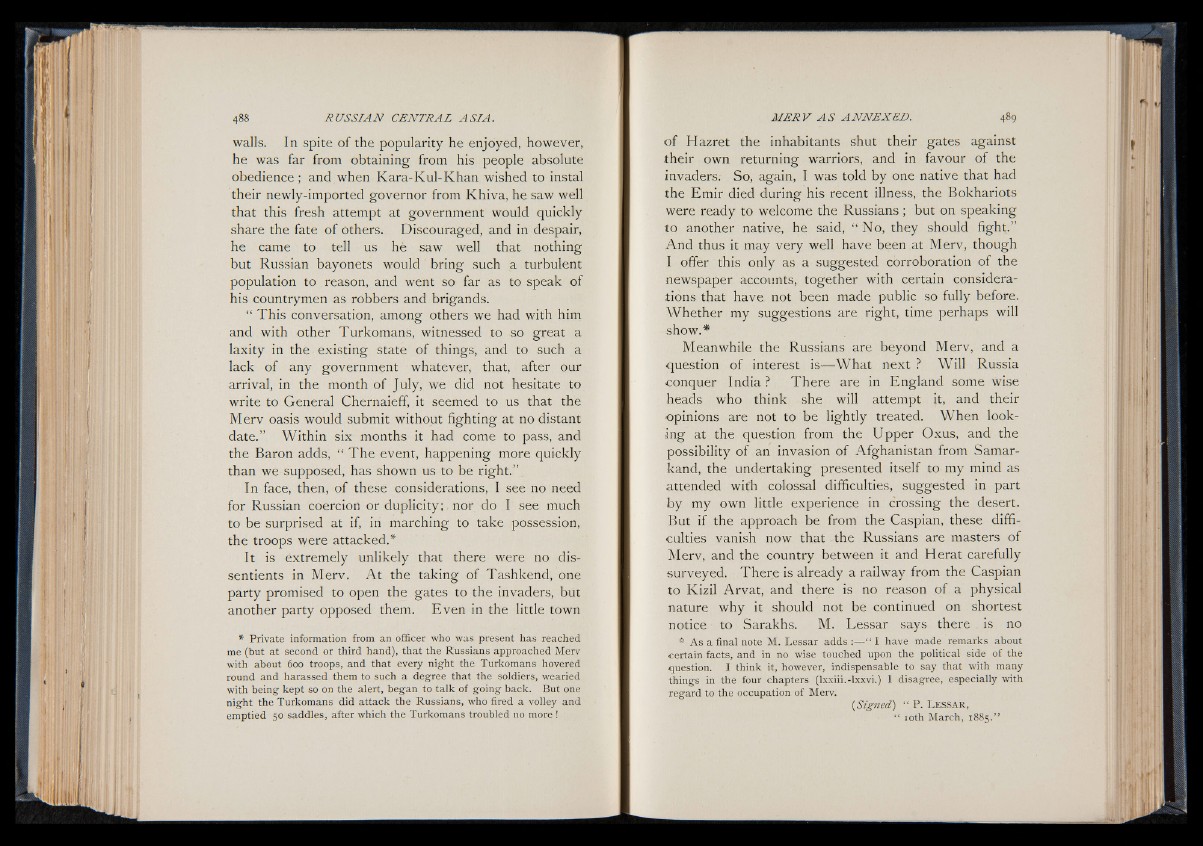
walls. In spite of the popularity he enjoyed, however,
he was far from obtaining from his people absolute
obedience | and when Kara-Kul-Khan wished to instal
their newly-imported governor from Khiva, he saw well
that this fresh attempt at government would quickly
share the fate of others. Discouraged, and in despair,
he came to tell us he saw well that nothing
but Russian bayonets would bring such a turbulent
population to reason, and went so far as to speak of
his countrymen as robbers and brigands.
“ This conversation, among others we had with him
and with other Turkomans, witnessed to so great a
laxity in the existing state of things, and to such a
lack of any government whatever, that, after our
arrival, in the month of July, we did not hesitate to
write to General Chernaieff, it seemed to us that the
Merv oasis would submit without fighting at no distant
date.” Within six months it had come to pass, and
the Baron adds, “ T h e event, happening more quickly
than we supposed, has shown us to be right.”
In face, then, of these considerations, I see no need
for Russian coercion or duplicity; nor do I see much
to be surprised at if, in marching to take possession,
the troops were attacked.*
It is extremely unlikely that there were no dissentients
in Merv. A t the taking of Tashkend, one
party promised to open the gates to the invaders, but
another party opposed them. Even in the little town
* Private information from an officer who was present has reached
me (but at second or third hand), that the Russians approached Merv
with about 600 troops, and that every night the Turkomans hovered
round and harassed them to such a degree that the soldiers, wearied
with being kept so on the alert, began to talk of going back. But one
night the Turkomans did attack the Russians, who fired a volley and
emptied 50 saddles, after which the Turkomans troubled no more !
o f Hazret the inhabitants shut their gates against
their own returning warriors, and in favour of the
invaders. So, again, I was told by one native that had
the Emir died during his recent illness, the Bokhariots
were ready to welcome the Russians; but on speaking
to another native, he said, “ No, they should fight.”
And thus it may very well have been at Merv, though
I offer this only as a suggested corroboration of the
newspaper accounts, together with certain considerations
that have, not been made public so fully before.
Whether my suggestions are right, time perhaps will
show.*
Meanwhile the Russians are beyond Merv, and a
question of interest is— What next ? Will Russia
conquer India ? There are in England some wise
heads who think she will attempt it, and their
opinions are not to be lightly treated. When looking
at the question from the Upper Oxus, and the
possibility of an invasion of Afghanistan from Samarkand,
the undertaking presented itself to my mind as
attended wit'h colossal difficulties, suggested in part
by my own little experience in crossing the desert.
But if the approach be from the Caspian, these difficulties
vanish now that the Russians are masters of
Merv, and the country between it and Herat carefully
surveyed. There is already a railway from the Caspian
to Kizil Arvat, and there is no reason of a physical
nature why it should not be continued on shortest
notice to Sarakhs. M. Lessar says there is no
* As a final note M. Lessar adds :— “ I have made remarks about
certain facts, and in no wise touched upon the political side of the
question. I think it, however, indispensable to say that with many
things in the four chapters (lxxiii.-lxxvi.) 1 disagree, especially with
regard to the occupation of Merv.
{Signed.) “ P. L e s s a r ,
“ 10th March, 1885.”